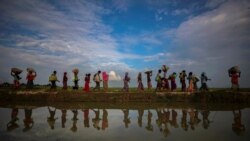01.07.2020 News headlines Author and artist: Sami Ahmed ● 'Rohingya must be expelled from India,’ says country’s union minister ● Rights groups call for better prison conditions in Myanmar (VOA Burmese Service) ● Canadian envoy says skilled workforce, better infrastructure will help Bangladesh grow faster ● Ayatollah sheds tears as Iran mourns dead general Shortwave, 31-meter band 9310 kHz 25-meter band, 11570 kHz, 12030 kHz Report: Mohammed Idris Abdullah (stringer) Topic: A Balukhali camp resident talks about his current life and earlier experience with the National Democratic Party for Development, a Rangoon-based political group pressing for Myanmar “to recognize [its] Muslim constituents in Arakan state as Rohingya,” as The Irrawaddy news site explains. Translation summary: Hafez Mohammed Nurullah came from Hair Mura Para village in Buthidaung township, where he served as a village representative to the National Development and Democratic Party (NDPD). He fled after Myanmar’s military – responding to a Muslim militant group’s deadly attack in northern Rakhine state – staged a massive “clearance operation” that killed thousands and drove more than 700,000 people out of the country. Now, he lives in Balukhali with six relatives, including two sons who study at NGO-run learning centers. Nurullah used to teach the Qoran at an Arabic school in Myanmar. Today he serves as an imam, which pays 3,000 takas ($35) a month. But he says that’s not enough to provide fish, meat or other supplements to the household’s rations from the World Food Program, which he says are insufficient. With the cool season, Rohingyas could use more warm clothing and blankets, Nurullah said, adding that those they initially received in 2017 have grown threadbare. When he lived in Myanmar, Nurullah attended quarterly meetings with the NDPD, Rohingya imams, teachers, village representatives and others, at which they discussed how Rohingya might remain safely in Arakan. In 2014, Nurullah said, 32 NDPD members were elected to Myanmar’s parliament, including four from Buthidaung township. The Myanmar government rejected two of them outright and expelled the remaining two within eight months. Then it began harassing and arresting NDPD members and other Rohingyas, Nurullah said. Finally, after the 2017 military crackdown, Nurullah left. He said he’s grateful to the Gambia for suing Myanmar in the International Court of Justice, where it is accused of violating the Genocide Convention by its treatment of Rohingyas. That case was filed in November; legal teams representing the Gambia and Myanmar addressed the ICJ in December as its judges consider whether to impose an emergency order protecting Rohingyas from further atrocities. Nurullah wants justice, he said, but he’s getting impatient as months pass in the Bangladesh migrant camp. Author & artist: Mohammed Idris Abdullah 2-way report: Hosts Sami Ahmed and Mohammed Hussain with Mohammed Rukon Uddin (stringer) Topic: Of the roughly 1 million Rohingyas living in camps and settlements in Cox’s Bazar, more than half – 55% – are under age 18, the United Nations says. The youngsters are not allowed to follow the school curricula of either Myanmar or Bangladesh, whose governments don’t want to encourage integration. Learning centers in the camps teach basic math, English, Burmese and life skills – and madrassas also teach the Qoran – but there are few educational options for kids older than 14. How do older youths spend their days? Mohammed Rukon Uddin reports from Kutupalong’s registered refugee Camp 1. The camp has at least one recreation center, where young guys gather to listen to music, play table tennis and board games such as carom. The young men also entertain themselves by playing football or other ball
খন্ড
-
![]() ডিসেম্বর ১৯, ২০২৫
ডিসেম্বর ১৯, ২০২৫Rohingya Broadcast
-
![]() ডিসেম্বর ১৮, ২০২৫
ডিসেম্বর ১৮, ২০২৫Rohingya Broadcast
-
![]() ডিসেম্বর ১৭, ২০২৫
ডিসেম্বর ১৭, ২০২৫Rohingya Broadcast
-
![]() ডিসেম্বর ১৬, ২০২৫
ডিসেম্বর ১৬, ২০২৫Rohingya Broadcast
-
![]() ডিসেম্বর ১৫, ২০২৫
ডিসেম্বর ১৫, ২০২৫Rohingya Broadcast
-
![]() ডিসেম্বর ১২, ২০২৫
ডিসেম্বর ১২, ২০২৫Rohingya Broadcast







